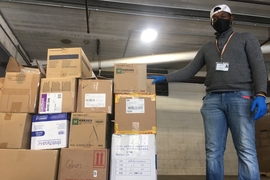As the Covid-19 crisis has erupted over the last month, MIT has worked closely with its home community to help the City of Cambridge weather this ongoing public health emergency.
The Institute’s assistance to both the city and its Cambridge neighbors have included direct financial support, suspension of rent for tenants in MIT-owned properties, space and housing for emergency responders in unused MIT buildings, and personal protective equipment to be used by medical professionals caring for Cambridge residents.
“MIT will continue its support of Cambridge’s nonprofits, small businesses, and residents as this crisis unfolds,” President L. Rafael Reif says. “The leadership of Mayor Siddiqui, City Manager DePasquale, and the City Council has been a powerful inspiration. With each passing day, it becomes more obvious that we are all interdependent, bound together as neighbors.”
The dynamics between universities and their municipalities — usually referred to as “town-gown relationships” — are typically steeped in issues related to land use, development, economics, and sustainability, says Sarah Gallop, co-director of MIT’s Office of Government and Community Relations. MIT’s longstanding relationship with the City of Cambridge is no different, she adds — and usually yields a productive framework of interactions.
“The steps taken to help our local community were able to be quickly implemented because of the breadth and depth of our existing town-gown relationship,” Gallop says. “MIT’s 100-plus-year bond with the City of Cambridge is founded on principles of mutual respect and responsibility.”
Town-gown relationships are essential during crises like this one, says Suzanne Blake, MIT’s director of emergency management, who has participated in the ongoing discussions of how the Institute could assist its Cambridge neighbors.
“Pandemics do not have borders, so it’s essential that we come together as a broader community to address these challenges. Thankfully, our existing relationships and coordinated planning with the City for other types of emergencies have served as a springboard to come up with creative and timely solutions to address the needs of this crisis for both MIT and Cambridge community members.”
MIT’s assistance to the City of Cambridge to help in its Covid-19 response has included the following:
$250,000 donated for homeless shelter: Cambridge is preparing the City’s War Memorial facility, at Cambridge Rindge and Latin School, for homeless individuals who may need safe housing, isolation, or medical treatment. Together, MIT and Harvard University provided $500,000 toward the construction of these spaces, which Cambridge will operate.
“In our ongoing effort to help the City of Cambridge respond to this crisis, supplying financial support to create the emergency shelter was a logical next step,” President Reif says. “As soon as we understood the need, we knew we wanted to help — and we are pleased to partner with Harvard on this critical initiative.”
$50,000 donated to the Mayor’s Disaster Relief Fund for Covid-19: MIT donated funds to help provide emergency assistance to Cambridge residents who are experiencing financial hardship.
Suspension of rent for 32 retail tenants: The Institute suspended rent for all of its retail tenants in Central Square, Kendall Square, and on campus. Of these tenants, 27 are small businesses.
Housing for Cambridge emergency personnel: MIT is providing housing for healthy and sick Cambridge first responders in two of its residence halls.
Personal Protective Equipment (PPE) distributed locally: So far, MIT has collected over 560,000 pieces of PPE from departments, labs, centers, and alumni for regional distribution. Cambridge needs were prioritized, and repeated donations are being made to the Cambridge Health Alliance, Cambridge Police Department, Cambridge Fire Department, Mt. Auburn Hospital, CASPAR homeless shelter, and other local nonprofits.
Emergency K-12 educational resources: A consortium of MIT education professionals created the website Full STEAM Ahead — a collection of teaching and learning materials for children, youth, parents, educators, and adults intended as a rapid response to the need for online resources. For K-12 students and teachers, the site provides a weekly package of MIT materials focused around specific themes. Topics to-date have included the nature of disease, developing creativity through invention, space exploration, and experiential learning through sound and music.
Commitment to provide classroom space, if needed: In the event that Massachusetts Gov. Charlie Baker calls public schools back into session this spring, MIT and Harvard have committed to providing classroom space for Cambridge Rindge and Latin students, since the homeless shelter will be operating on the public high school’s campus.
Providing assistance to the Cambridge workforce: The Job Connector by MIT is providing virtual counseling and online workshops for Cambridge residents regarding business sectors that are currently hiring, as well as how best to navigate the state’s unemployment process.
Supporting local nonprofits: Several MIT offices — government and community relations, community services, and the Priscilla King Gray Public Service Center — are focused on supporting Cambridge nonprofits that provide basic services to residents. Increased funding, advocacy, guidance, and PPE donations are among those augmented activities.
Sharing time and expertise: Jill Crittenden, a research scientist at MIT’s McGovern Institute for Brain Research and the co-chair of Cambridge’s Covid-19 Expert Advisory Panel, developed food market/takeout safety guidance that was implemented locally, in collaboration with the Cambridge Public Health Department. MIT staff are also serving on the Mayor’s Disaster Relief Fundraising Taskforce and the Cambridge Community Foundation’s Cambridge Artist Relief Fund grant review committee.
Cambridge will face new and changing Covid-19-related needs in the weeks and months to come, and MIT will continue to try to be responsive to its longtime town-gown partner.












